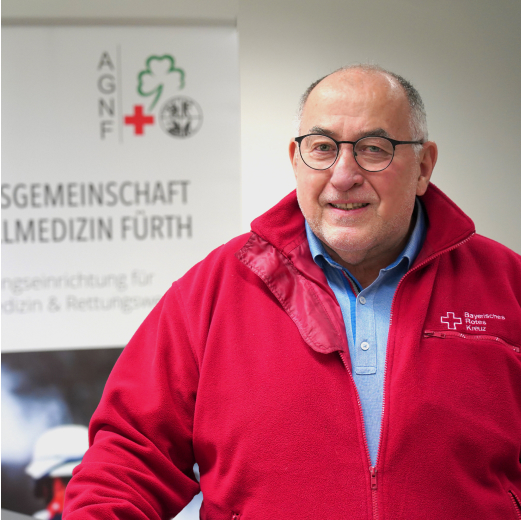As a BRK representative, he has been a member of the Management Board and now the Supervisory Board since the AGNF was founded. We are therefore all the more pleased that he will remain with us in his role at the AGNF.
What appeals to him most is the opportunity “to promote and maintain the proximity between BRK Fürth and AGNF. I am still active in various areas of the BRK and therefore believe I can continue to act as a mediator.” He is pleased that his “work on the Supervisory Board of AGNF will now also strengthen cooperation and collaboration between the two organizations” and is certain that “both BRK and AGNF can benefit from good networking.”
From major fires and floods to the coronavirus pandemic – as a disaster relief officer, Arthur Sieder has experienced emergencies, strokes of fate and tragedies at first hand. Despite all the suffering, there are moments that he particularly likes to think back on: “A few days ago, a BRK colleague of mine said in a newspaper interview that it is important for the helpers to be allowed and required to laugh every now and then, especially during longer missions, alongside the serious work. In fact, such moments were also important and formative during my missions in the 2002 and 2013 floods. During the often depressing and painful missions in the rescue service, it was also the quiet and calm moments after a mission.”
Especially little things like “the elderly lady who brought “cakes for the nice helpers” to our 70-strong support contingent at the registration head during the flood operation in Plattling in 2013″ remain fond memories for him.
Arthur Sieder came to volunteering in the traditional way “via first aid courses, paramedic training, sports field services and the slow introduction to the rescue service”, which were decisive for his many years of sustained work in acute and emergency medicine.
For young people who want to follow in his footsteps, he has the advice to “in addition to learning medical skills, gently teach your soul how to deal with the suffering and pain of others”. Because “perhaps this will help you to cope with the challenges and stresses of this job even after many years.” He also considers “continuous learning and further training in emergency medicine and disaster control” to be extremely important. “This is the only way to gain the necessary security and routine for an emergency – which may never happen, especially in disaster control.”
During his time as a manager at the BRK, he has always been concerned with recruiting young talent. He warns against “scaring away people interested in our work with the “statutory duties” as soon as they join. The fields of activity of the aid organizations are so diverse that it must be possible for interested members to decide for themselves in which areas they want to be active.”
He has found that interested people “do not want to be confronted with a catalog of duties right from the start”. Aid organizations in particular “need to offer flexible volunteering opportunities that enable young people in particular to combine their volunteer work with their studies, work and leisure activities.”
In his experience, modern means of communication and social media play a key role in this: “A strong presence on popular platforms can help to raise awareness of the organization’s work and appeal to young people.”
At AGNF, Arthur Sieder follows “all projects with great interest” and sometimes regrets “that active support for some projects fails due to age alone.” After FÜRTH SCHOCKT!, the starting signal has been given for ERLANGEN SCHOCKT! and other regions will follow. The educational offering was repositioned under the bildung37° brand. A new educational campus is to be built around the association’s headquarters in Stein and the vocational school for emergency paramedics located there. And our international commitment is attracting more and more attention.
Looking back, Arthur Sieder found the AGNF’s activities during the coronavirus crisis very exciting, as he “personally had the opportunity to actively support various projects in conjunction with the BRK.” In future, he will follow the “structural development and realization of the educational campus” with particular interest, if only because of his professional background as an engineer. In connection with the FÜRTH SCHOCKT! project, he would like to “continue to advocate for the BRK to contribute its existing expertise.”
When asked about his wishes for acute and emergency medicine and disaster control in and around Fürth, Arthur Sieder’s thoughts turn to improving equipment and strengthening volunteer work in society.
In terms of equipment, “continuous and sufficient funding from state and local authorities” would be essential to “ensure that rescue services and civil protection are always optimally equipped.” He would like to see “a similar commitment from the public sector to that of the fire departments.” Especially in times of increasing natural disasters and other emergencies, “it is important that our emergency services can respond quickly and effectively.” Because “an improved infrastructure and state-of-the-art technology would significantly increase operational capability and help to save lives and minimize damage.”
For him, strengthening volunteering in society is about “public recognition and appreciation”, for which “the Bavarian volunteer card is a good example.” He also believes that “promotion and support, possibly through financial incentives, tax relief or financial support for training and further education” are other key factors. And the “support from employers” makes it much easier to get involved as a volunteer.
We look forward to working with Arthur Sieder in the future and hope he continues to enjoy his work and the free time he has gained!
